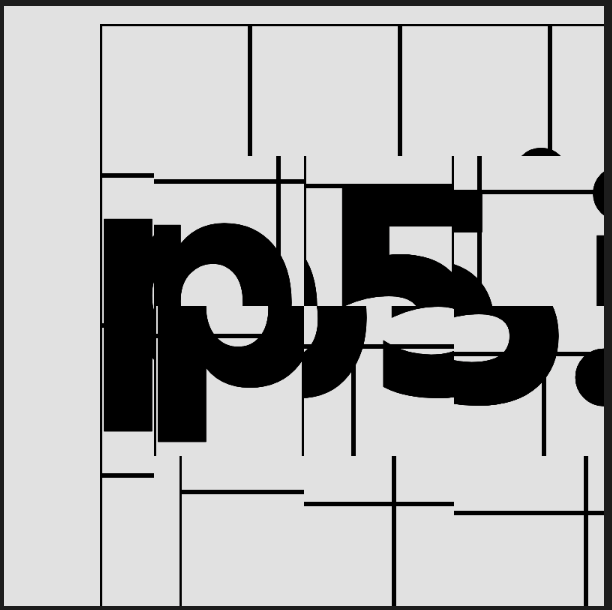p5j.s Typography
Using System fonts in p5.js is quite simple. You can also load your own fonts and use them to type on the canvas
let myFont;
function preload() {
myFont = loadFont('helvetica.otf'); //load your own font
}
function setup() {
fill(0,0,255);
textFont(myFont);
textSize(36);
text('p5*js', 10, 50);
}
In order to make interactive, kinetic typography, you need to use p5.Graphics. By calling createGraphics(w, h, [renderer]) you can draw into an off-screen graphics buffer. It allows you to overlay graphics on top of the canvas
The following example is based on https://timrodenbroeker.de/processing-tutorial-kinetic-typography-1/
// GRID
const g = 100; // cell width
const cellnum = 5; // numbers of cells per row and column
// BASIC
let cg; //canvas
// SOURCE
let sx;
let sy;
let sw;
let sh;
// DESTINATION
let dx;
let dy;
let dw;
let dh;
var wave;
function setup() {
createCanvas(400, 400);
cg = createGraphics(400, 400);
cg.fill(0,0,0);
cg.textFont("Hind");
}
function draw() {
background(225);
// grid();
cg.push();
cg.translate(width / 2, height / 2);
cg.textSize(200);
cg.textAlign(CENTER, CENTER);
cg.text('p5.js', 0, 0);
cg.pop();
for (let x = 0; x < cellnum; x++) {
for (let y = 0; y < cellnum; y++) {
wave = int(cos((frameCount + ( x*y )) * 0.1) * 200);
// SOURCE
sx = x * g + wave;
sy = int(y * g + (wave*0.2));
sw = g;
sh = g;
// DESTINATION
dx = x * g;
dy = y * g;
dw = g;
dh = g;
copy(cg, sx, sy, sw, sh, dx, dy, dw, dh);
}
}
grid();
}
function grid() {
for (let i = 0; i < cellnum; i++) {
for (let j = 0; j < cellnum; j++) {
//show grid background
cg.strokeWeight(random(1,3));
cg.stroke(0);
cg.noFill();
cg.rect(i * g, j * g, g, g);
}
}
}
Another method to manipulate the font is to use textToPoints(txt, x, y, fontSize, [options])method, which allows us to create a vertex array on the path which define a specific string.
